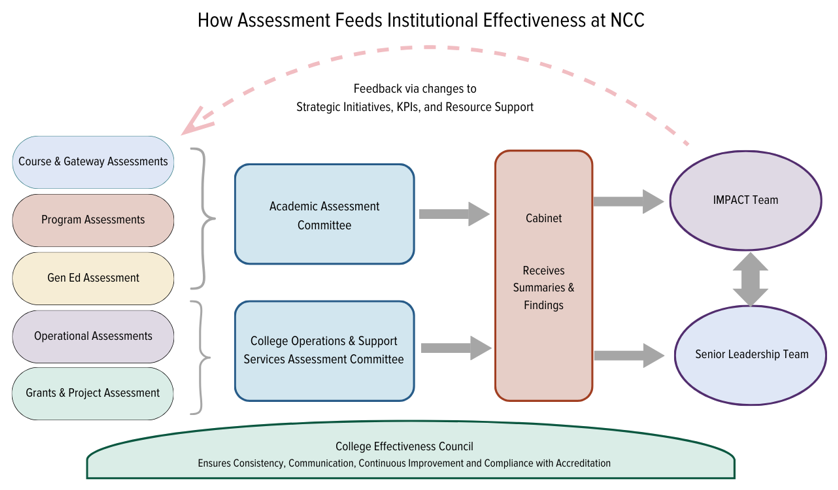The Office of Institutional Effectiveness provides leadership, oversight, management, and integration of the College's institutional research, planning, and assessment activities.
The mission of the Office of Institutional Effectiveness (IE) is to provide leadership and support for institution-wide planning, assessment, evaluation, reporting, and research compliance activities in support of NCCs mission. The Office's efforts are directed toward identifying, analyzing, and monitoring internal and external trends and developments that influence NCC's mission and strategic mission. We work collaboratively with college constituents to ensure that the data and analyses provided meet their needs for planning and assessing institutional effectiveness, as Northampton Community College is always striving for continuous, institution-wide improvement.
Roles/Responsibilities
With NCC’s Mission and Goals at the forefront of all we do, IE oversees the implementation of strategic plan tactics, assessment of the level of progress, and the use of data to inform continuous institutional improvement. To help benchmark the progress of college-wide assessment, OIE engages in benchmarking of Key Performance Indicators (KPIs) using various data sources (e.g., IPEDS, PIMS, ATD, VFA, CCSSE). The IE team engages in regular planning sessions to ensure the integration of assessment strategies into NCC’s long-term vision as it relates to the institution as a whole.
The Office of Institutional Effectiveness (IE) facilitates student learning assessment and non-teaching assessment at NCC by partnering with members of the campus community to determine whether existing college services support student learning. Student learning assessment is guided by the Academic Assessment Committee. The College Operations & Support Services Assessment Committee (COSSAC) oversees non-academic assessment.

College Effectiveness Council (CEC)
The College Effectiveness Council (CEC), housed within the Office of Institutional Effectiveness, oversees all college-wide assessment policies and procedures, while ensuring assessment results are communicated to the college community in alignment with accreditation standards. The CEC provides an assessment framework that is transparent, systematic, and sustainable, allowing for budgetary advocacy and institutional accountability. While discipline/departmental outcomes and improvement efforts are owned by each respective unit of the college, CEC ensures consistent practice occurs throughout the College. The CEC will review assessment cycles, establish timelines for the collection and reporting of data, ensure a process is established by COSSAC and the Academic Assessment Committee for informing Senior Leadership and the IMPACT Team of assessment results to drive planning and budgetary decision-making, while ensuring continuous quality improvement at NCC.
Contact:
- Dr. Scott Schaeffer, Director, Assessment (co-chair) @ sschaeffer@northampton.edu
College Operations and Support Services Assessment Committee (COSSAC)
COSSAC oversees and supports all non-teaching assessment conducted at NCC and is responsible for:
The College Operations and Support Services Assessment Committee is responsible for overseeing the assessment of all the non-teaching, operational units of the college. They help to articulate the goals, purpose, or outcomes of a functional area. They guide college staff in the collection of qualitative and quantitative data to determine whether a particular operational unit is meeting their stated goals, purpose, or outcomes and utilizing the gathered data to improve institutional effectiveness and quality.
Contact:
- Barry Saturen, Director, Learning Center (co-chair) @ bsaturen@northampton.edu
- Scott Schaeffer, Director, Assessment (co-chair) @ sschaeffer@northampton.edu
Academic Assessment Committee (ACC)
Contact:
- Jen Richardson, Assistant Dean, Academic Assessment and Program Evaluation (chair) @ jrichardson1@northampton.edu
The Office of Institutional Research (IR) provides analysis of key indicators of student performance, retention, graduation, and transfer across all student demographics. IR coordinates with academic and non-academic units (including student affairs, administration, advancement) to support assessment of strategic and annual objectives.
- Complies with required reporting – both internal and external (e.g., IPEDS, ATD, VFA, PIMS)
- Provides course and program data for periodic reviews (success rates, retention rates, graduation rates, etc.)
- Ensures the integrity of data used for communications, planning and institutional improvement
Contact:
- Daniel Sisco, Associate Director, Institutional Research @ dsisco@northampton.edu
The Office of Institutional Effectiveness collaborates with academic, administrative, and student service offices to assist in reaching divisional/departmental goals. One way we do this is by designing and administering surveys. We administer surveys to students, faculty & staff, graduates & alumni, as well as other populations as needed.
In addition to administering in-house surveys, we also facilitate the administration of third-party surveys such as the Community College Survey of Student Engagement (CCSSE) and the Student Financial Wellness Survey (SFWS).
The Office of Institutional Effectiveness analyzes and disseminates survey results to all constituents of NCC. We can provide you with customized or filtered reporting depending on your data needs.
Contact:
- Sam Temples @ stemples@northampton.edu
Northampton Community College (NCC) encourages and supports scholarly research and projects that contribute to increasing student success and improving the quality of instruction. Pursuit of scholarly research often involves the use of human subjects for data collection and analysis.
NCC's IRB helps to ensure that:
- the rights and welfare of human subjects used in research studies are protected;
- risks have been considered and minimized;
- the potential for benefit has been identified and maximized;
- all human subjects only volunteer to participate in research after being provided with legally effective informed consent;
- and any research is conducted in an ethical manner and in compliance with established standards.
The basic ethical principles that govern the IRB in assuring that the rights and welfare of subjects are protected are contained in The Belmont Report and in accordance with 45 CFR 46.
The goal of NCC's IRB is to: Provide all community members with information, guidance, forms, and related materials needed to secure IRB approval for human subject research. Review, approve, require modifications to, or deny human subject research conducted at Northampton Community College.
Contact:
Dr. Scott Schaeffer, Chair of IRB, at sschaeffer@northampton.edu"Accreditation" is review of the quality of higher education institutions and programs. In the United States, accreditation is a major way that students, families, government officials, and the press know that an institution or program provides a quality education. There are two basic types of educational accreditation; one type is known as "institutional" and the other is referred to as "specialized" or "programmatic." Northampton Community College is accredited by both types of accreditors.
Scott Schaeffer, D.C.
Director, Assessment
Chair, Institutional Review Board (IRB)
sschaeffer@northampton.edu
Daniel Sisco
Associate Director, Institutional Research
dsisco@northampton.edu
Sam Temples
Institutional Effectiveness Analyst
stemples@northampton.edu



